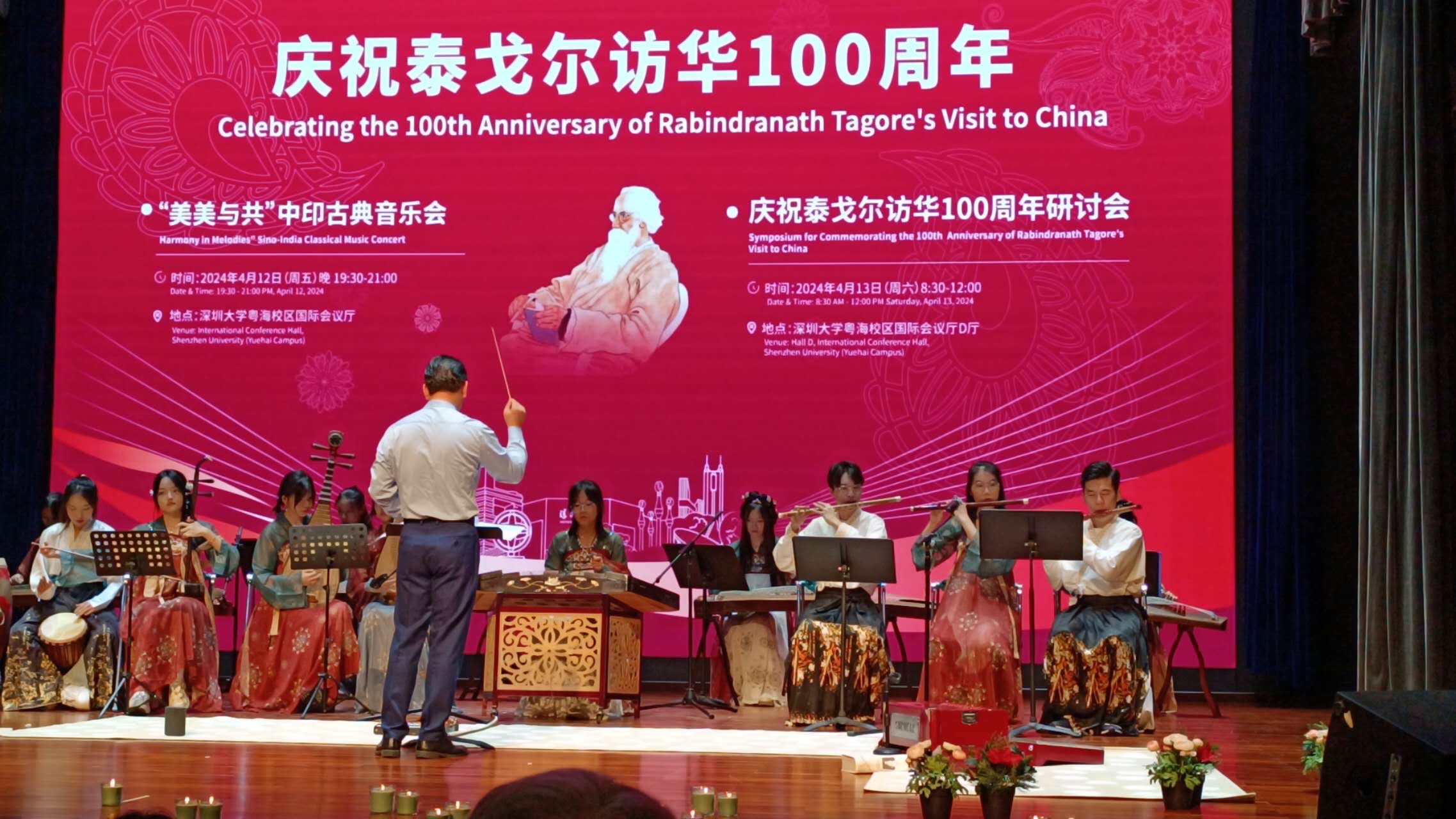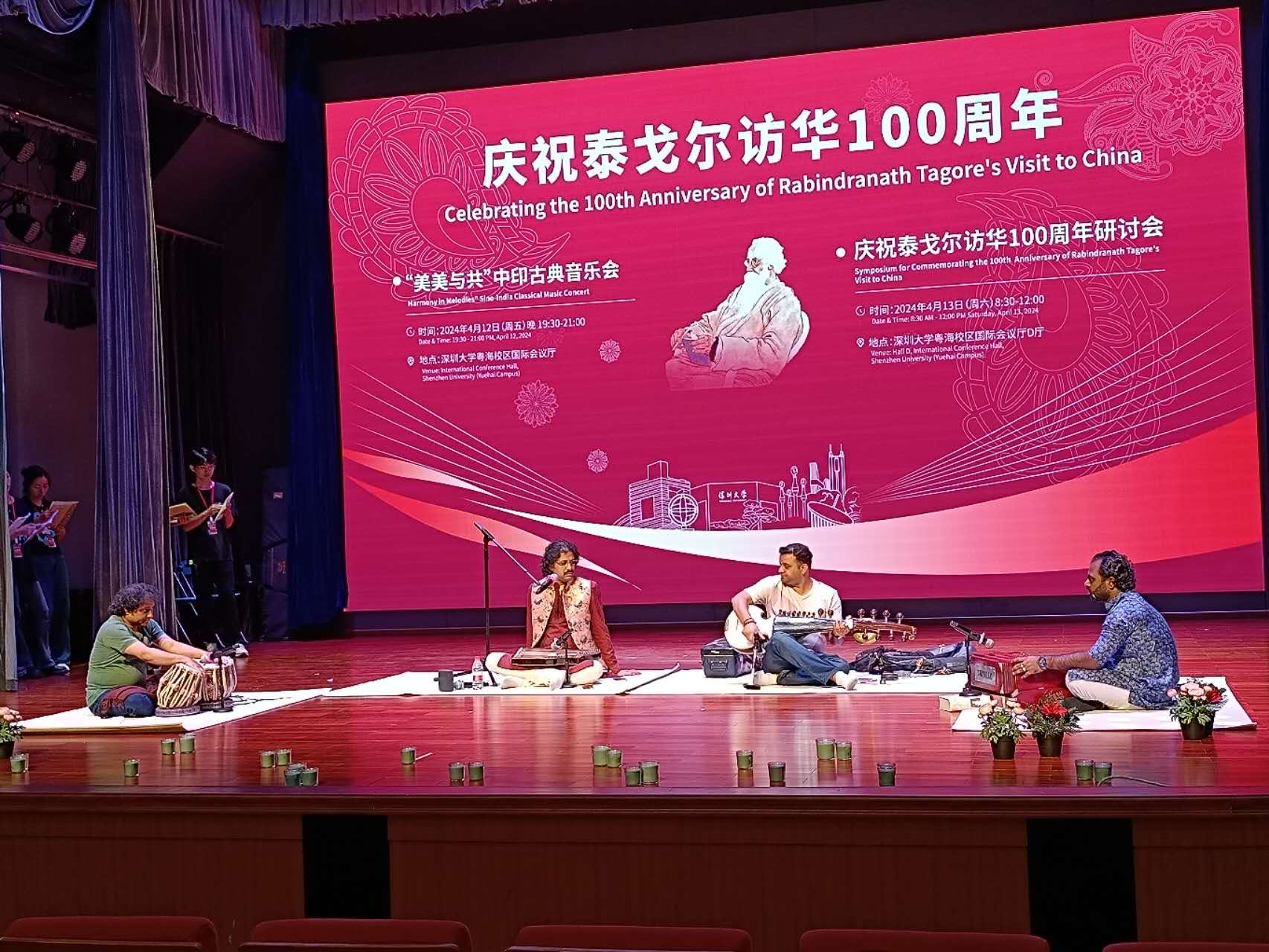Bridging cultures: celebrating the 100th anniversary of Rabindranath Tagore's visit to China
Writer: Syam Melethil Sethumadhavan | Editor: Liu Minxia | From: | Updated: 2024-04-15
In honor of the centennial anniversary of a pivotal moment in the cultural exchange between India and China marked by the visit of the admired poet, philosopher, and Nobel laureate, Rabindranath Tagore, the Center for Indian Studies at Shenzhen University coordinated a grand classical music concert on the evening of April 12.
Titled "Harmony in Melodies: China-India Classical Music Concert," the event served as an emotional tribute to Tagore's continuing legacy and the profound impact of his journey to China a century ago.

A scene from the concert. Photos by Syam Melethil Sethumadhavan
Tagore, affectionately known as Gurudev, embarked on his voyage to China not merely as literary ambassador, but as an indication of understanding between two ancient civilizations. His exploration exceeded mere geographic boundaries, echoing deeply with the universal language of art and philosophy.
The concert, held at Shenzhen University, unfolded as a symphony of cultural fusion and artistic brilliance, reflecting the ethos of Tagore's vision. The program, precisely curated, showcased a diverse array of performances, each weaving together the rich tapestry of Indian and Chinese musical traditions. Musicians, both from India and China, collaborated harmoniously, embodying the spirit of cultural amalgamation that Tagore advocated.
The journey commenced with the ethereal strains of "Ascending the Spring Hill," performed by the Shenzhen University Art Troupe's "Shengxi" Traditional Orchestra, setting the stage for an evening of enchantment and harmony.
Other highlights of the evening included:
1. Indian Classical Music Improvisation: An exquisite display of virtuosity featuring Supriya Dutta (vocal), Smit Tewari (Sarod), Bivakar Choudhury (Tabla), and Debasish Adhikary (Harmonium), captivating the audience with their mastery of Indian classical music.
2. Guqin Solo and Ensemble: Ma Xiao's mesmerizing rendition of "Flowing Water" on the Guqin, followed by a dynamic collaboration with Smit Tewari and Bivakar Choudhury in "Drunk and Wild," showcased the seamless integration of Chinese and Indian musical elements.
3. Guzheng Ensemble and Song Performance: Li Dandan led an ensemble performance of "Combating Typhoon" on the Guqin, followed by a captivating rendition of "Song of Tianshan," featuring Huang Yanrong, Zheng Huiting, Jiang Qiufang, Hu Yapei, Pan Weiqi, and Hu Chenxi, accompanied by Bivakar Choudhury on Indian instruments. The evening also featured a soul-stirring rendition of "A Glass of Good Wine" by Liu Liliang and Supriya Dutta.
4. Indian Kathak Classical Dance and Tagore Dance: Narmrata Rai and Souraja Tagore mesmerized the audience with their graceful performances, seamlessly blending the artistry of Indian Kathak Classical Dance with Tagore's timeless choreography.

A performance given by Indian musicians at the concert.
The concert culminated in the splendent finale with the Shenzhen University Art Troupe's "Shengxi" traditional Orchestra, accompanied by Bivakar Choudhury, in "Journey of the Elephant King," symbolizing the enduring spirit of cultural exchange and collaboration.
As we commemorate the 100th anniversary of Tagore's historic visit to China, let us reflect on the profound resonance of his legacy, which continues to transcend borders and inspire generations. May the melodies of harmony, compassion, and cultural exchange, symbolized by Tagore's vision, continue to resonate and enrich our interconnected world.